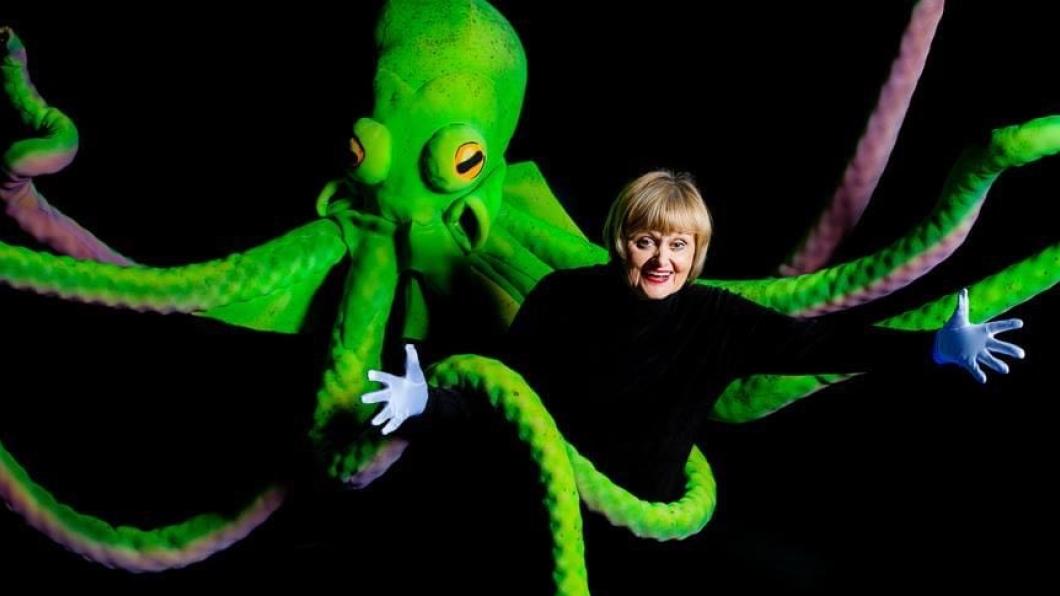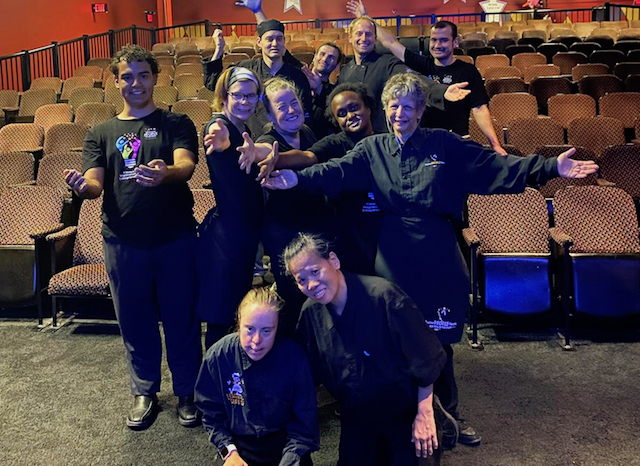
Puppet troupe helped drive disability inclusion in Ontario
By Louise Kinross
Famous PEOPLE Players is a black light theatre company in Toronto that trains people with intellectual disabilities as performers. “Think of glow-in-the-dark life-size characters,” says founder Diane Dupuy (photo above), animated by actors hidden in black costumes. Players (photo below) learn to manipulate the puppets and props, which appear to float in the air. They also learn to cook and serve patrons, who enjoy a meal and a show. The group has performed in Las Vegas and on Broadway. We spoke to Diane about its long history.
BLOOM: What is a simple way of explaining black light puppetry?
Diane Dupuy: It’s where everything on the stage glows in the dark. The performers are invisible. They make all the props and life-sized characters float in the air to music. It mesmerizes you.
BLOOM: How did you get interested in working with people with disabilities in the first place?
Diane Dupuy: It was 1973 and I was a volunteer at Surrey Place Centre in Toronto for the ‘mentally retarded.’ That’s what we were called back then. One of our volunteer jobs was to go to Orillia to spend a day at the institution. There were no doors on the washrooms and no forks or knives to eat with there, and it broke my heart.
There was a blizzard that day and it took us six hours to come back to Toronto on the bus, so I had a lot of time to think. I believed if we integrated these kids into the community they would mirror others.
I did puppetry at the time. I went to a doctor who was the head of the national program for [people with intellectual disabilities] and I told him I had an idea of how we could start a black light theatre. At that time, people with disabilities weren’t allowed to be integrated. There were special buses and special schools with those horrible names on them.
By using black light, we could hide the performers, because in the 1970s you had to hide people with disabilities. I applied for a federal grant and my mother made life-size puppets.
Six months passed and Liberace was coming to town to perform at the old O'Keefe Centre. I wrote a letter to see if I could get him to see the company and had no response.
I called his manager in Los Angeles and pretended I was the secretary to Prime Minister Pierre Elliot Trudeau, and Mr. Trudeau would be attending a performance at The Inn On The Park and would like him to be the guest of honour. They were very intrigued and letters went back and forth and I got Liberace to come. We made a Liberace puppet as part of the performance.
I picked him up at the Royal York Hotel and when I saw him I said to myself ‘this puppet doesn’t look anything like this man.’ We got into the room and cameras were flashing because he was so famous and I thought ‘He’s not even going to notice that Pierre Trudeau isn’t here.’
The curtain went up and it was as if a magic wand came in and ‘Bibbidi-Bobbidi-Boo,’ everyone was so professional. At the end of the performance they took their black hoods off and came to present Liberace’s table with a rose, and he signed us on the spot to open for him in Las Vegas. He was so excited to see his puppet that he was moved to tears.
That’s how changes came to our system. We were the pioneers that brought integration to the forefront of the world. Bill Davis was Ontario’s premier and he was inspired by us and shut down the segregated schools and put kids into the regular school system.
BLOOM: What roles do people with disabilities play at your theatre?
Diane Dupuy: They learn to do everything. From rehearsal to performance to work in the kitchen and setting up in the restaurant.
BLOOM: Do they pay for the training?
Diane Dupuy: They pay $500 a month. We subsidize the full cost through donations and sponsorship. After the program we help them with their resumés and finding employment. Some are hired on to be a core part of the company.
BLOOM: What is most challenging about running Famous PEOPLE players?
Diane Dupuy: We like to pride ourselves on working without government operating grants. Since 1977, we earned our way by ticket sales and donations and sponsorship. Scotiabank is a major sponsor. Then COVID came and we had to shut down for two-and-a-half years, and we had to take the grants that were available to try to sustain ourselves. Coming back from COVID has been even more difficult. We are really struggling financially.
BLOOM: What’s the greatest joy?
Diane Dupuy: The joy is when I see how I can help somebody get from a really rough spot to something great. That always moves me.
BLOOM: I noticed you also offer education programs.
Diane Dupuy: The Stars of Tomorrow is our new alternative creative school. It’s a program for high school students who have trouble fitting into the regular school system. They could have a disability or ADHD or find it hard to engage with school because they’re bored. They’ll experience a range of academic and hands-on learning courses led by a teacher. It might be learning math by cooking in the kitchen.
In addition to performances, Famous PEOPLE Players offers theatre and entrepreneur workshops to school students and corporate events. Next year the group celebrate 50 years. To make a reservation for dinner and a show, visit Famous PEOPLE Players. Like this story? Sign up for our monthly BLOOM e-letter.
